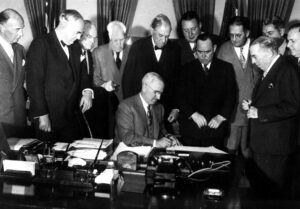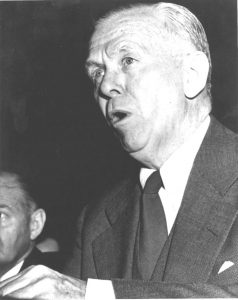
President Truman signing Marshall Plan legislation, April 3, 1948
With the quick strokes of a pen, seventy-six years ago today, President Harry S. Truman changed the course of world history. On April 3, 1948, at his desk in the Oval Office, he signed into law the Foreign Assistance Act of 1948, which Congress helpfully suggested could also be referred to as the Economic Cooperation Act of 1948. However, neither of these prosaic names stuck. Instead, the United States and the world would know the measure by the name of the man whose reputation and force of will ensured its passage through Congress: it was the Marshall Plan.
President Truman’s signing of the bill looked innocuous enough, surrounded by Congressional leaders for the photo-op. But notably absent is the man for whom the plan would be named and who was largely responsible for its passage, Secretary of State George C. Marshall.

Destruction in Italy, WWII
When Marshall introduced the idea of the United States providing economic relief to the war-torn nations of Europe on June 5, 1947 in a speech at Harvard, he did so knowing that it would likely not meet with a warm reception. The country had only recently emerged from a war that pushed the federal budget into uncharted territory, taking on massive debt to wage a global conflict. By 1946, the federal debt stood at nearly $250 billion, which represented about 113 percent of the nation’s GDP and would translate into almost $3 trillion today. There was wide sentiment in the public and in the halls of Congress that America had done its part and should focus on its own transition to a peacetime economy.

Marshall testifying before Congress, 1948.
Marshall and his closest advisors knew, however, that the economies of Europe faced collapse and the specter of the Soviet Union waiting to exploit the chaos that might ensue. In short, the United States risked winning the war and losing the peace. After his Harvard speech, Marshall brought to bear all the tools at his disposal to persuade the public and the Republican-controlled Congress that it was in America’s national interest to spend billions of dollars to prop up the economies of Europe. For months he campaigned tirelessly in the public through the media and with influential legislators in hearings and private conversations. So great was Marshall’s reputation for candor and non-partisanship that his arguing for the measure helped grow support for the plan to aid Europe. Certainly, Harry Truman recognized that only Marshall had the reputation and goodwill to persuade America of the benefits of aiding both one-time allies and foes.
It is perhaps typical of Marshall that he was not present for the president’s signing of the bill that ushered in the plan that would bear his name. Selfless to a fault, he did not seek the spotlight for doing what he saw as the right thing for his country. His reward was, as always, getting the job done.
